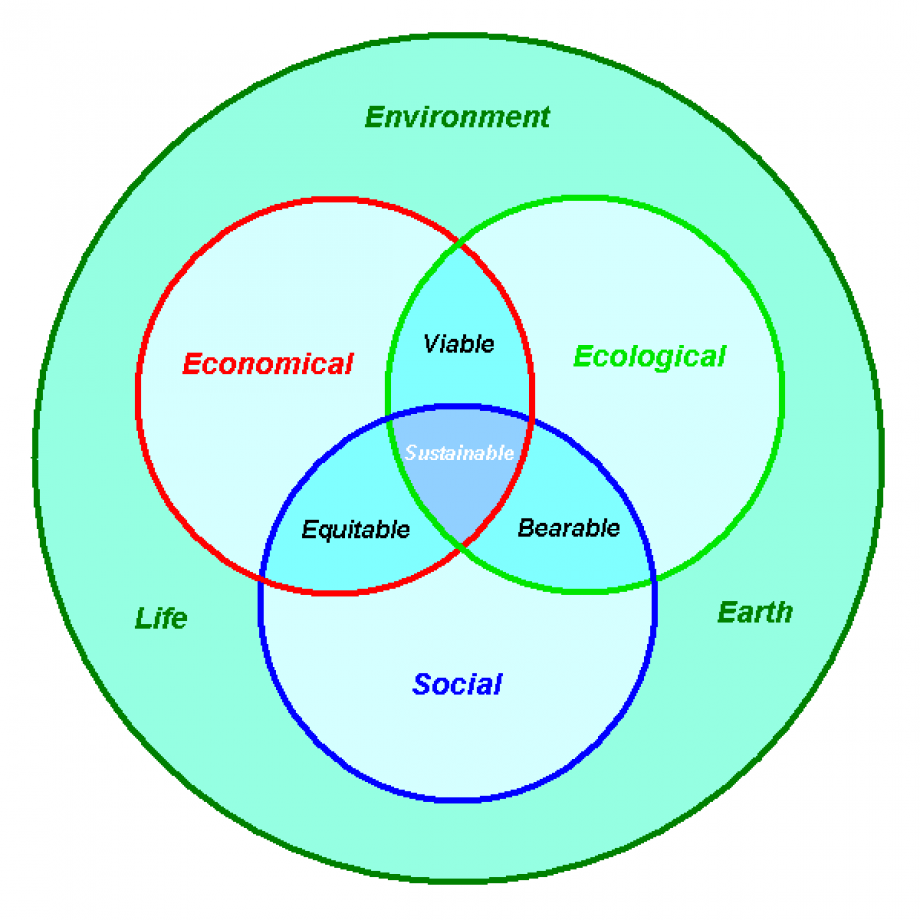The transition to a resource-saving and sustainable economy is one of the largest challenges of our century. The preservation and augmentation of capital is a self-evident tasks for companies, but sustainability in managing ecological and social resources is still relatively new. Economics was often conceived as a set of rules, based on abstract models, for the development of businesses and economies, which seemed to have no relation to social and ecological contexts. Even today, we still use mathematical models from the 19./20. century to predict, understand and analyse economical processes.
In the past, entrepreneurial sustainability meant achieving economic advantages over competitors. Economic factors such as shareholder value, revenue, profit, and market shares were the main focus of businesses.
As Milton Friedman said: «The business of business is business»
Social and ecological problems were, according to this understanding, the responsibility of the state. That has changed in the last 20, 30 years. Sustainability has now become an integral part of management in many, at least globally active, companies. Businesses have improved their operations so that they consume fewer resources and produce less waste. In short, they have become more efficient and have increased their profits and the shareholder value of their company.
But this is not enough in terms of a sustainable business development . The equation of a more efficient use of existing resources with sustainability is a way too short thought. Such an approach encourages the widespread belief that, with the help of technologies, we are able to make better and longer use of existing resources and do not have to change our consumption behaviour.
Triple Bottom Line (TBL)
The so-called triple bottom line ( people, planet and profit) is a framework to evaluate business performance in a broader perspective to create greater business value.
This framework has led to legal changes around the world and resulted in the creation of new types of enterprises. It also influenced the way businesses do business:
Stages of business development
- Economical development and increasing shareholder value
- Developing and increasing of Shareholder-Value and managing (re-active) economical, ecological and social challenges related to it by reducing the negative impact of the business on society
- Integration of environmental, social and governance issues in business processes by developing a positive impact of the business on society (pro-active)
I guess the majority of businesses is still at stage 1 and/or 2, only a few companies are focusing on positive contribution to resolve societies’ sustainability problems. Even though many companies claim that they are acting sustainable, but still are not involved or supportive in solving social and global challenges. Most of the companies are still following a reactive approach on those challenges to comply with regulations (CO2 / NOx – Emissions, safety regulations, ISO 14001, etc.).
HOW TO DEVELOP A BUSINESS SUSTAINABLY?
As described above, increasing profits and shareholder value alone is not sufficient for sustainable business development. Probably, the way how the business is done and the business culture itself needs to undergo a change. Quite often, business models are very old-fashioned just as are their working processes and technical infrastructure. Technology is often rather seen as a threat to the business (decreasing customer loyalty through constant availability of internet access ) than a benefit.
A continuous, regular reassessment of resources, processes, prices, benefits and customer values will soon show under-performing segments of your business. Do you know the cost – income rate for each of your services/products?
By simplifying processes and the use of scalable, (open source) technical infrastructure, costs can be cut to make money available for necessary investments in new product/service/professional education development.
When it comes to process optimisation, companies are quick in reducing costs by reducing the number of employees or decreasing payment instead of thinking and testing new working (and payment) models like e.g. remote work. Remote work might not work for all professions, but for a lot of people working in administration, marketing, IT.
The incapability of handling such an organisational change and the fear on both sides, on employers and employees, to either lose control or to get fired, is a big hurdle .
In this context, transparency is as big challenge and can be powerful accelerator in balancing interests of shareholders/owners, employees and the society, ending up redefining the company culture. It’s not done by just changing the public relation strategy but focusing on customer values and giving space for creativity when it comes to further professional development helps to drive customer oriented development and creates openness to change.

